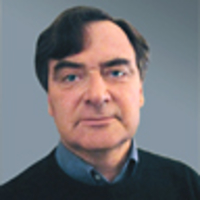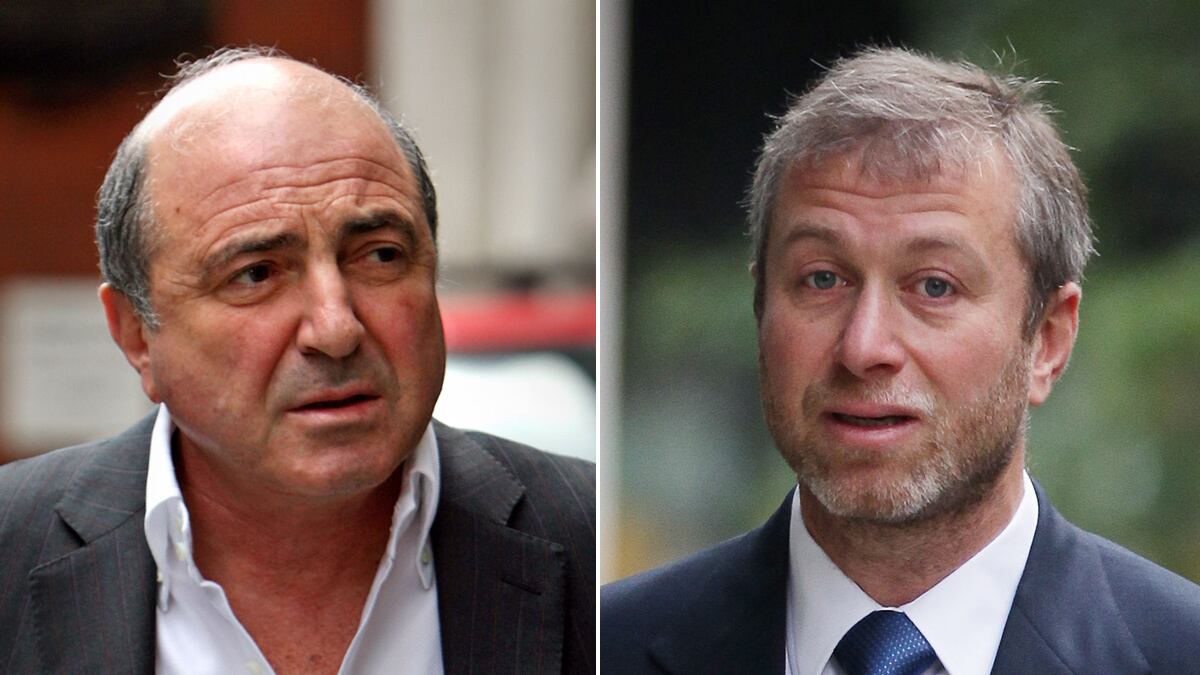Russian oligarch Roman Abramovich was not “smart” enough to gain the “leverage” needed for big-business success in the Russia of the mid-’90s. He was not a businessman of “the first level” at the time, and he had lied about his qualifications. Or so claimed his onetime mentor, Boris Berezovsky, testifying in a London court Thursday.
This was Day Four of the grand slugging match between two of Russia’s best-known billionaires, and the gloves came off when 65-year-old Berezovsky took the stand for the first time in the Commercial Court to give evidence in a richly colorful trial that’s expected to last at least three months.
Squads of dark-suited lawyers filled three rows of desks in Courtroom 26, leaving little space for the thronging press—British and Russian—and the public. “There is no courtroom in the land that’s big enough to accommodate all of you,” said the judge, Mrs. Justice Gloster, in response to a request for extra seating. (On his way to the stand, a good-humored Berezovsky offered his own chair to the press.)
Berezovsky, now in exile in Britain, is claiming that in 2001 he was forced to sell a 21.5 percent holding in the Russian oil giant Sibneft, a company he helped to create with Abramovich in the country’s privatization bonanza of the mid-’90s, for far less than its true value, pocketing just $1.2 billion.
He’s now seeking $6 billion in damages, alleging that Abramovich “intimidated” him into the sale by telling him the shares would otherwise be seized by the Russian goverment, headed by his old enemy, then-President Vladimir Putin. In reply, Abramovich, 44—and now best known in Britain as the owner of Chelsea Football Club—said he was never a Sibneft shareholder.

Berezovsky’s lawyers took the opportunity to query his adversary’s “smartness,” quizzing Abramovich about the need for political backing in the Russia of President Boris Yeltsin, the era when the oligarch accumulated much of $800 million fortune. The main reason for his own political influence, he claimed, had been “intellectual capacity.”
In a written witness statement, Berezovsky hinted at his former protege’s gift for schmoozing as an explanation for his success.. “He is good at getting people to like him and good at psychology in that way. He is good at appearing to be humble. He is happy to spend days just socializing with important or powerful people if that is what is needed so he can get closer to them.”
Sitting across the courtroom, Abramovich listened to a Russian translation of proceedings through headphones. Berezovsky, cutting a confident figure in an open-neck shirt and blue suit, spoke in English although he asked to be given the text of some crucial documents in their original Russian.
What emerged under cross-examination was a picture of his own ascent to a position of power under Yeltsin, who had effectively authorized the privatization of Sibneft. Berezovsky acknowledged that he was the first businessman to join the president’s exclusive tennis club and that he had befriended Yeltsin’s son-in-law and daughter.
On the other hand, he denied any improper use of his influence. He was “definitely against” corruption and never offered a bribe. “My way is not to make presssure,” he said. “My way is to persuade—and why it is important to do [something].” His principal aim in control of the loss-making broadcaster ORT in 1995 was not to make money but to help defeat the Communists in the 1996 elections, he said.
And he denied any suggestion that he had “fixed” the shares-for-loans auction of Sibneft in 1995 even though he had ensured that his own company had emerged as the sole bidder.
But under questioning, Berezovsky was forced to admit some apparent contradictions between his evidence and previous statements. He appeared to concede his influence over Yeltsin’s decision-making even though the same claim had featured in a libel action that he brought against Forbes magazine in 1997 that was settled in 2003.
The court was also told of documents allegedly approved by Berezovsky that asserted he had no “shareholding or other interest” in Sibneft. Said Jonathan Sumption, who represents Abramovich: “You tell the truth when it suits your case but not otherwise.”






